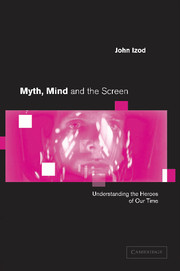Book contents
- Frontmatter
- Contents
- Acknowledgments
- Introduction
- 1 Jungian theory, textual analysis and audience play
- 2 Archetypal images: signification and the psyche
- 3 Archetypal images: symbols and the cultural unconscious
- 4 The Piano, the animus and colonial experience
- 5 The pop star as icon
- 6 The quest of a female hero: The Silence of the Lambs
- 7 Television sport and the sacrificial hero
- 8 The polycentred self: The Passion of Darkly Noon
- 9 Haunted: searching for the whole self
- 10 Transforming the final ghost: the god within
- Conclusion
- Filmography
- Glossary of Jungian and related terms
- References
- Index
Introduction
Published online by Cambridge University Press: 22 September 2009
- Frontmatter
- Contents
- Acknowledgments
- Introduction
- 1 Jungian theory, textual analysis and audience play
- 2 Archetypal images: signification and the psyche
- 3 Archetypal images: symbols and the cultural unconscious
- 4 The Piano, the animus and colonial experience
- 5 The pop star as icon
- 6 The quest of a female hero: The Silence of the Lambs
- 7 Television sport and the sacrificial hero
- 8 The polycentred self: The Passion of Darkly Noon
- 9 Haunted: searching for the whole self
- 10 Transforming the final ghost: the god within
- Conclusion
- Filmography
- Glossary of Jungian and related terms
- References
- Index
Summary
Cinema, television and the related media fascinate their audiences in a variety of ways, but entertainment is what most people want when they pay for leisure products. Well aware of this, the media industries build their profits by seeking to gratify audiences' expectations that what they are buying will give them pleasure. The potent impact of moving pictures on the imagination is plain from audience response. A particularly striking feature film or television drama will be received with the most intense private and public reactions. And ever since they first became sources of popular entertainment, both large and small screens have been channels for deeply felt legends, myths and cults. The most exciting fictional characters catch the public's attention and pass into popular discourse where they may remain familiar figures for years. Then too there is the enduring phenomenon of stardom and the hero-worship associated with it.
Orthodox modes of Media Studies have developed effective means of analysing some aspects of the screen experience, including narratives, characters and settings, not to mention the control of style through sound and imagery. However, most spectators want films to give them a buzz through the arousal of intense emotions. Particularly in the case of movies, with their creation of a world that appears entire unto itself, many viewers want the screen's fantasy to lift them in imagination out of their own daily lives.
- Type
- Chapter
- Information
- Myth, Mind and the ScreenUnderstanding the Heroes of our Time, pp. 1 - 14Publisher: Cambridge University PressPrint publication year: 2001



